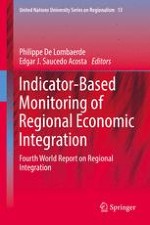2017 | OriginalPaper | Buchkapitel
14. Opening the Black Box of Trade Agreements
verfasst von : Tristan Kohl
Erschienen in: Indicator-Based Monitoring of Regional Economic Integration
Aktivieren Sie unsere intelligente Suche, um passende Fachinhalte oder Patente zu finden.
Wählen Sie Textabschnitte aus um mit Künstlicher Intelligenz passenden Patente zu finden. powered by
Markieren Sie Textabschnitte, um KI-gestützt weitere passende Inhalte zu finden. powered by
